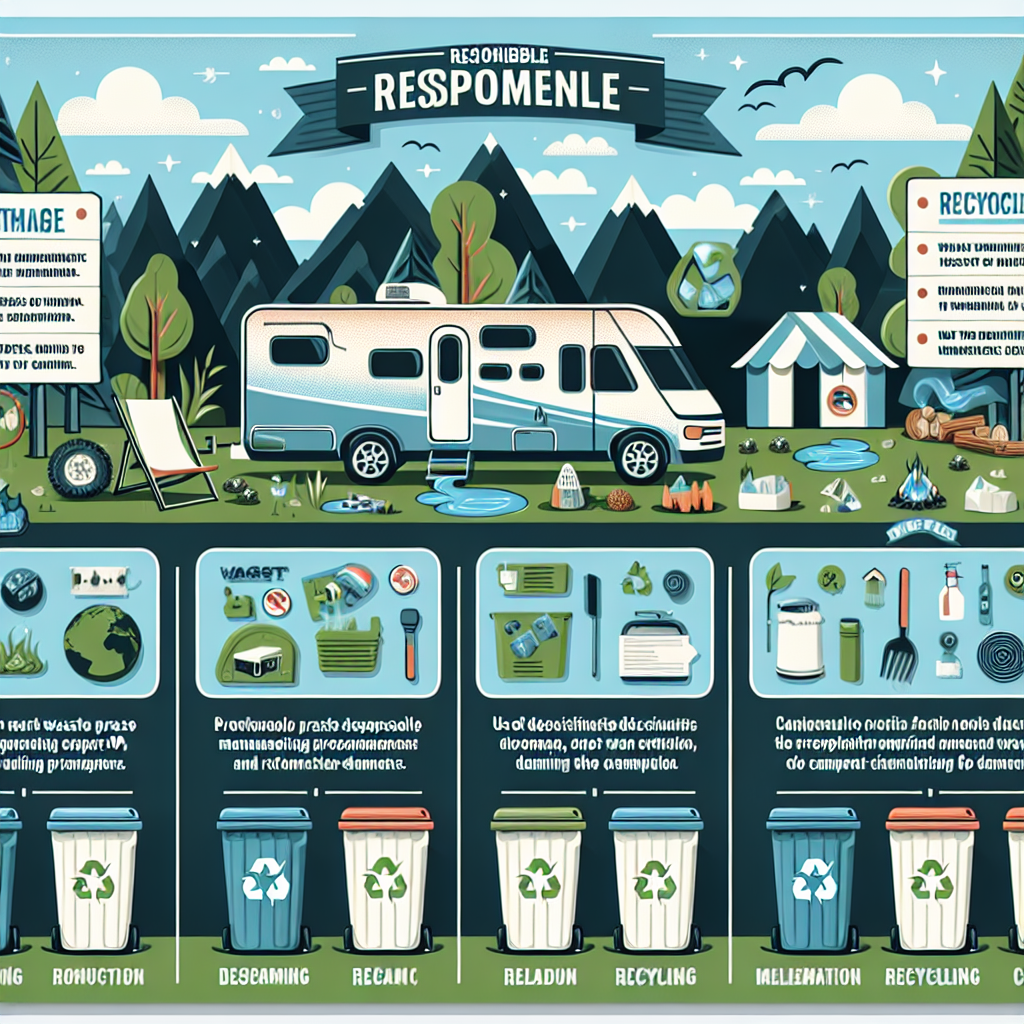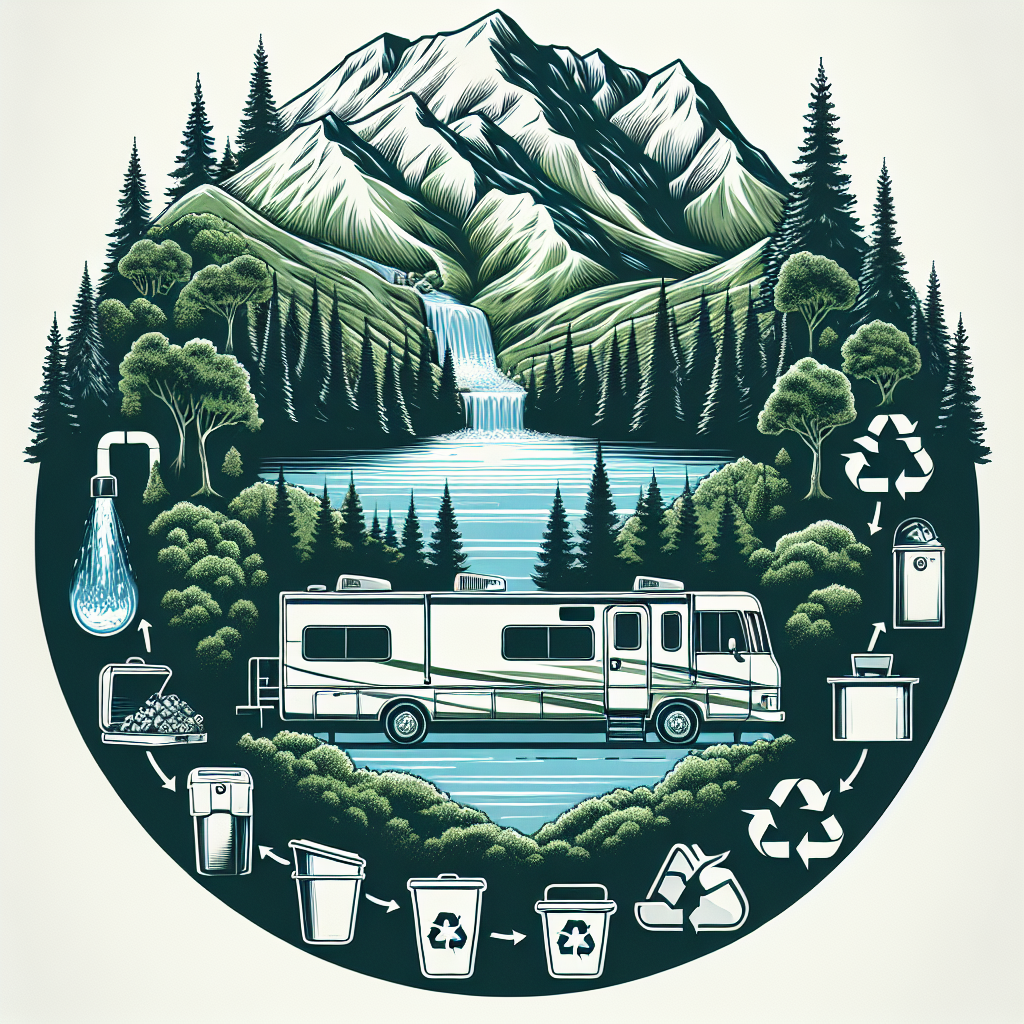Planning a fun-filled RV camping trip? Don’t forget about the important task of waste disposal! Whether you’re a seasoned RVer or a newbie, it’s crucial to handle waste disposal properly to protect the environment and ensure a pleasant experience for yourself and fellow campers. In this article, we’ll provide you with 10 essential tips for proper waste disposal while RV camping, helping you navigate this aspect of outdoor living with ease. So, let’s get started and make sure that your camping adventures remain worry-free and environmentally-friendly.

Choosing the Right RV Waste System
When it comes to waste disposal while RV camping, choosing the right RV waste system is crucial. There are a few options available, including cassette toilets, portable holding tanks, and built-in sewage systems. Each option has its pros and cons, so it’s essential to consider your specific needs and preferences.
Cassette toilets are a popular choice for RV owners due to their portability and ease of use. These toilets feature a detachable waste tank that can be easily emptied and cleaned at designated dump stations. Portable holding tanks, on the other hand, provide a larger capacity for waste storage and can be transported to dump stations using a tow vehicle. Lastly, built-in sewage systems offer the convenience of a permanent solution; however, they require regular maintenance to ensure proper functioning.
Take the time to research and compare different RV waste systems before making a decision. Factors such as tank capacity, ease of use, and availability of dump stations should all be considered. By choosing the right RV waste system, you can ensure a hassle-free and efficient waste disposal process during your RV camping adventures.
Understanding Local Regulations
Before embarking on your RV camping trip, it’s crucial to familiarize yourself with the local regulations regarding waste disposal. These regulations can vary from one location to another, so it’s essential to be aware of any specific rules or restrictions that may be in place.
Many campgrounds and RV parks require campers to use designated dump stations for waste disposal. Some municipalities also have specific guidelines for disposing of waste, including restrictions on dumping certain types of waste or limitations on the hours of operation at dump stations.
To avoid any unnecessary fines or penalties, do your research and understand the local regulations before you arrive at your RV camping destination. Contact the campground or RV park directly or visit their website for information on waste disposal guidelines. By being aware of and following the local regulations, you can ensure a smooth and compliant waste disposal experience.
Use Certified Dump Stations
Once you understand the local regulations, the next step is to identify and use certified dump stations for your waste disposal needs. Dump stations are specifically designed facilities where RV owners can empty their waste tanks safely and hygienically.
Certified dump stations are regulated and regularly inspected to ensure proper maintenance and cleanliness. These stations often charge a small fee for usage, but it’s a small price to pay for the convenience and peace of mind they provide. The funds collected from these fees are typically used to cover the costs of waste disposal infrastructure and maintenance.
When searching for certified dump stations, consider utilizing online resources or RV camping apps that provide updated and reliable information on their locations, hours of operation, and any additional amenities they may offer. By using certified dump stations, you can rest assured that your waste is being disposed of properly and in accordance with local regulations.
Emptying the Black Water Tank
One of the primary waste disposal tasks for RV owners is emptying the black water tank. The black water tank is specifically designed to hold and store human waste from the RV’s toilet. Properly emptying the black water tank is essential for maintaining a sanitary and odor-free RV camping experience.
To empty the black water tank, follow these steps:
- Locate the dump station at your campground or RV park.
- Put on disposable gloves and any other necessary personal protective equipment.
- Connect the sewer hose provided at the dump station to the RV’s waste outlet.
- Open the black water tank valve slowly and allow the contents to flow out into the sewer system. Be sure to monitor the process and close the valve once the tank is empty.
- Rinse the black water tank by using the facility’s cleanout hose or by adding a specific tank-cleaning solution to the tank and then filling and emptying it a few times.
By following these steps, you can effectively and hygienically empty the black water tank, ensuring a clean and odor-free RV camping experience.

Emptying the Grey Water Tank
In addition to the black water tank, RVs also have a grey water tank that holds wastewater from the kitchen sink, bathroom sink, and shower. Emptying the grey water tank is a necessary step in waste disposal while RV camping.
To empty the grey water tank, follow these steps:
- Connect the sewer hose provided at the dump station to the RV’s waste outlet.
- Open the grey water tank valve, allowing the wastewater to flow out into the sewer system.
- Close the grey water tank valve once the tank is empty.
- Rinse the grey water tank by using the facility’s cleanout hose or by adding a tank-cleaning solution and then filling and emptying it a few times.
Properly emptying the grey water tank is essential for maintaining a clean and hygienic RV camping environment. By following these steps, you can ensure that the grey water tank is emptied efficiently and without any unpleasant odors.
Properly Storing and Securing Waste
When it comes to waste disposal while RV camping, it’s not just about emptying the tanks; it’s also essential to properly store and secure waste during your trip. This includes the use of appropriate waste storage containers and taking necessary precautions to prevent any leaks or spills.
Invest in high-quality waste storage containers that are specifically designed for RV use. These containers should be durable, leak-proof, and easy to clean. Consider purchasing containers with secure lids and handles for convenient transportation and disposal.
Always double-check that waste containers and tanks are securely sealed before hitting the road or moving your RV. Secure them in a position that minimizes the risk of any accidental spills or leaks. Additionally, store them away from any food or water sources to prevent contamination.
By properly storing and securing waste, you can eliminate any potential health hazards and maintain a clean and enjoyable RV camping experience for yourself and fellow campers.

Managing Solid Waste
While the focus of waste disposal in RV camping primarily revolves around liquid waste, it’s also important to address the management of solid waste. Solid waste includes items such as food scraps, packaging materials, and other non-liquid waste generated during your trip.
To manage solid waste effectively, follow these tips:
- Utilize designated trash receptacles provided at the campground or RV park. Separate recyclable and non-recyclable items accordingly.
- Consider using compacting devices or bags to minimize the volume of solid waste generated and make it easier to store and dispose of.
- Avoid burning solid waste unless it is explicitly permitted by the campground or park management. Always follow any local regulations and guidelines regarding open fires and waste burning.
By properly managing solid waste, you can contribute to a cleaner and more sustainable RV camping experience.
Minimizing Waste Generation
One of the most effective ways to deal with waste disposal while RV camping is to minimize waste generation in the first place. By adopting a waste-conscious mindset and making small changes to your habits and practices, you can significantly reduce the amount of waste generated during your trips.
Here are some tips for minimizing waste generation:
- Carry reusable water bottles and avoid single-use plastic bottles.
- Opt for reusable containers and bags for food storage instead of disposable options.
- Choose products with minimal packaging or opt for bulk purchases to reduce packaging waste.
- Pack and prepare meals in advance to minimize food waste.
- Embrace recycling by separating recyclable materials and ensuring they are disposed of properly.
By minimizing waste generation, you not only reduce the environmental impact of RV camping but also simplify the waste disposal process and ensure a cleaner and more enjoyable camping experience.

Using Biodegradable Cleaning Products
While on the road, it’s crucial to use biodegradable cleaning products to minimize the environmental impact of waste disposal. Traditional cleaning products often contain harmful chemicals that can pollute water sources and harm wildlife.
Look for cleaning products that are specifically labeled as biodegradable and environmentally friendly. These products are designed to break down naturally in the environment without causing harm. They are typically made from plant-based ingredients and do not contain harsh chemicals that can be detrimental to ecosystems.
By using biodegradable cleaning products, you can ensure that the waste generated from cleaning activities is less harmful to the environment. This small change can make a significant difference in preserving the natural beauty of the RV camping destinations you visit.
Disposing of Hazardous Waste Responsibly
It is essential to dispose of hazardous waste responsibly to protect both the environment and human health. Hazardous waste includes items such as batteries, propane tanks, chemical products, and other materials that can be harmful if not disposed of correctly.
Never dispose of hazardous waste in regular trash bins, toilets, or drains. Instead, follow these guidelines for responsible disposal:
- Locate designated drop-off centers or recycling facilities for hazardous waste disposal in the area.
- Contact local waste management agencies or environmental organizations for information on proper disposal methods.
- Avoid purchasing hazardous products whenever possible by opting for eco-friendly alternatives.
By disposing of hazardous waste responsibly, you minimize the risk of contamination and contribute to a healthier and more sustainable RV camping environment.
In conclusion, waste disposal is an essential aspect of RV camping that requires careful consideration and responsible practices. By choosing the right RV waste system, understanding local regulations, and using certified dump stations, you can ensure a smooth and compliant waste disposal process. Properly emptying the black water and grey water tanks, storing and securing waste, and managing solid waste are crucial steps in maintaining a clean and enjoyable RV camping environment. Additionally, adopting practices such as minimizing waste generation, using biodegradable cleaning products, and disposing of hazardous waste responsibly contribute to a more sustainable and eco-friendly RV camping experience. With these tips in mind, you can navigate the world of waste disposal while RV camping with ease and finesse.



